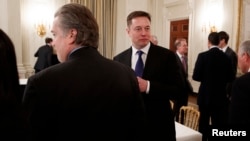With the presidential election less than three months away, Silicon Valley, home to some of the most valuable companies in the U.S. economy as well as many of its richest men and women, is flexing its considerable political muscle in the effort to influence voters’ choice in November.
However, tech leaders are very far from consensus when it comes to a preference between former President Donald Trump, the Republican nominee, and Vice President Kamala Harris, who recently replaced President Joe Biden at the top of the Democratic ticket.
Some of the most prominent names in technology and tech investing, such as Tesla founder and X owner Elon Musk and Andreessen Horowitz founder Marc Andreessen, have very publicly allied themselves with Trump. Others, including LinkedIn founder Reid Hoffman and entrepreneur Mark Cuban, are backing Harris.
Experts say influential figures in the industry are balancing a number of concerns, including how they think each candidate will handle antitrust policy, whether they will help or harm American companies’ efforts to compete internationally, and social issues that do not necessarily bear directly on the industry.
Global competition
“They want to be globally competitive,” said Daniel Castro, vice president of the Information Technology and Innovation Foundation, a nonprofit focused on science and technology policy.
“They recognize that they need a political and regulatory environment that is good for American companies and good for the U.S. tech industry. And so, they’re paying attention to a number of factors that can influence that.
“That’s everything from regulatory policies around [artificial intelligence], the big emerging technology policies around digital platforms and social media, and policies around China, specifically,” Castro told VOA.
China is a particularly delicate subject, because U.S. tech companies want to be able to sell into its enormous market, while at the same time being protected from unfair competition from China’s state-favored industries.
Castro said tech companies see a potential upside and downside to victory by either party.
Harris comes from California and has a long history of working with and supporting technology firms. However, she comes out of a Biden administration that has been aggressively enforcing antitrust laws that many in the industry see as hampering growth.
Trump, by contrast, is expected to be less concerned with antitrust issues. However, there are concerns that some of his economic policies, including sweeping tariffs on imports and a sharp increase on duties on Chinese goods, could damage U.S. companies’ global competitiveness.
Source of donations
“Both candidates want campaign contributions from the tech sector. Each has cultivated that,” said Darrell M. West, a senior fellow with the Brookings Institution’s Center for Technology Innovation. “Harris came from California. She actually has been funded by the tech sector pretty well. Over the years, Trump has reached out to the more libertarian-minded ones, including Elon Musk, and hopes to get multiple millions from each of those.”
However, he said, in recent months, Harris has been more vocal in calling out big tech firms in her public statements.
“Harris has actually talked pretty tough on the tech sector in her campaign speeches,” West told VOA. “She regularly rails against the big corporations engaged in price gouging and limiting competition. … She wants to raise taxes on the tech billionaires. So, I think increasingly, her political stance has moved her in a more aggressive manner in that way.”
Libertarian support
There has always been a strong libertarian thread running through the U.S. tech sector, and the Trump campaign appears to have connected tightly to that element of Silicon Valley. His selection of Senator JD Vance, a former Silicon Valley venture capitalist and protege of billionaire tech investor Peter Thiel, helped cement that support.
Thiel, who supported Trump in 2016, had a falling out with the former president over his sense that he failed to deliver on many of his promises while in the White House. Now, he appears to have returned to supporting Trump. However, in an interview with The New York Times in late July, he said that he had no plans to contribute to the campaign.
Others, however, are making sure their financial and cultural weight is felt.
Musk has sent contradictory signals about whether he will provide large amounts of money to the Trump campaign but has been supportive on his X feed, which has nearly 200 million followers. Trump this week announced that he would sit for an “interview” with Musk on August 12.
Others, like PayPal co-founder David Sacks, have hosted high-dollar fundraisers for Trump, introducing him to other wealthy tech entrepreneurs.
Social concerns
Harris has been drawing support from other prominent names in Silicon Valley, some who balance their concerns about competitiveness with worries about social issues.
In the weeks since her ascent to the party’s nomination. Hoffman, the LinkedIn founder, has announced his public support, even as he called on Harris to announce that she will fire Lina Khan, the current head of the Federal Trade Commission. Hoffman has, for years, been a vocal supporter of many left-leaning causes, including expanded voting rights and immigration protections.
Cuban, who among other things has used his wealth to fund a startup that sells people low-cost prescription medications, said in an interview Wednesday that after initially supporting Trump years ago, he soured on the former president, calling him “unethical.” In late July, he threw his support behind Harris.
The Harris campaign has significant support from lower-profile denizens of Silicon Valley. In late July, Leslie Feinzaig, founder and general partner of Graham & Walker Venture Fund, began circulating an open letter pledging support for the Harris campaign.
Over the next week, more than 750 venture capital professionals signed on to a new organization called VCs for Kamala, pledging their support in the weeks ahead.



